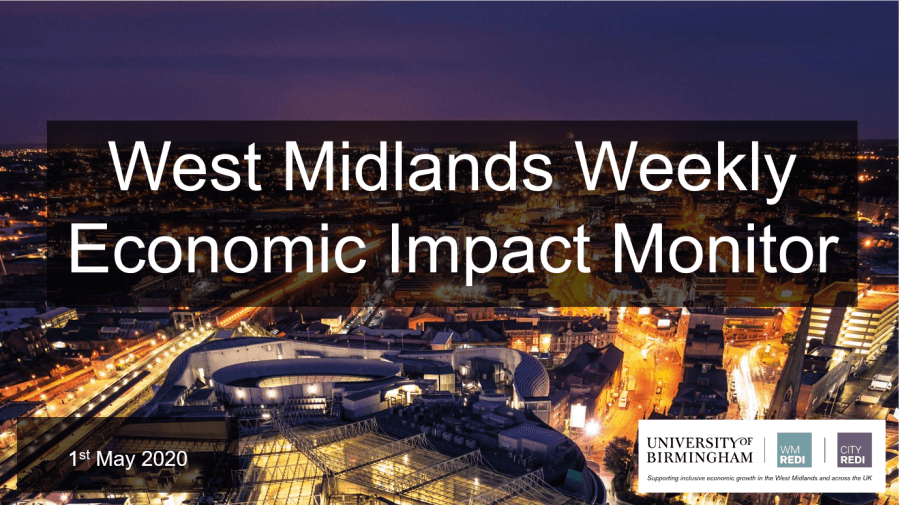 WM REDI has been tasked with providing an up to date monitor of the current Covid-19 economic impacts, on a weekly basis. These reports will help regional partners to shape responses and interventions to boost the region’s resilience so that it can thrive going forward. Each week the focus of the report is based on research and evidence published that week.
WM REDI has been tasked with providing an up to date monitor of the current Covid-19 economic impacts, on a weekly basis. These reports will help regional partners to shape responses and interventions to boost the region’s resilience so that it can thrive going forward. Each week the focus of the report is based on research and evidence published that week.
- More reports and research are now being published, many of which say Birmingham will be one of the hardest-hit places. Oxford Economics predicts it will be the worst-hit city in the EU. This is because of the dependency on automotive and education (Higher Education Institutions), a younger than average population and high levels of health issues.
- Of particular issue to the West Midlands is the University sector, the region has more universities than anywhere else after London, they support 155k students and have a direct expenditure of £2.6bn in the region and £12bn indirect and supports 71,000 jobs, which puts GVA at £7.5bn (manufacturing worth £11bn). This sector is predicted to be one of the hardest hit due to international student numbers and impact on private sector investment in R&D.
- The region has seen significant growth through construction and property markets, but all analysts are agreeing that this will take a major hit. Through drop in investment, and also changes which may occur to what people demand from living and working space as a result of lockdown. The importance of outside space and safe social distancing working cold profoundly impact on the type of property that is in demand. This would negatively impact on flexible working spaces as consumers prioritise safety and get used to working at home. This move to home working could also make businesses reconfigure their space to reduce how often people are in the office and therefore what they need in city-centre locations.
- Across the various business surveys, main messages are: cash reserves are being used and are rapidly depleting; workforces have stayed relatively stable but there is a significant rise in furloughing; whilst redundancies remain low hours are reducing, there is a drop in contract staff and significant homeworking (50% of workers)
- Inequality is likely to get worse as in other recession/pandemics. Employees aged under 25 years are about two and a half times as likely to work in a sector that is now shut down, like others, so raising the need for specific interventions to support them. Universal Credit (UC) in the last fortnight of March 2020 was 7.3 times higher than the same period a year earlier
- Businesses need to understand how they return to work. This includes access to PPE, implementing social distancing measures and dealing with their workforce wellbeing. There is a need for guidance and support in planning for recovery, including business diversification and operating in social distancing environments.
Before the onset of COVID-19, the region was in a period of significant growth, based on a burgeoning construction sector; a thriving city centre international business and professional services sector also driving high levels of business tourism; a manufacturing base becoming more productive and an automotive sector responding to the challenge of a carbon-neutral future; high exports, foreign direct investment and strong international links, and the biggest higher education cluster outside London. All powered by a young workforce. However, underlying this growth there were significant issues with inequality, poverty, youth unemployment, low skills, poor health and school performance.
The weekly monitor brings together data and intelligence from the WM REDI partnership into one single source which can be shared and utilised in planning and responding to the challenge of the virus. This is a rapid review of the issues and not intended to be a comprehensive assessment but a practical report which places emphasis on emerging issues and the best data and intelligence we have to date.
The monitor is feeding into the regional recovery plan that can help the regional economy bounce back and quickly move forward once lockdown restrictions start to be lifted.
The work is being endorsed by political and business leaders a task force of experts are being set up through WM REDI Partners to better understand the impact of the lockdown and what measures will be needed to get the economy moving again.
Download and view a copy of the West Midlands Weekly Economic Monitor.
City-REDI / WM REDI have developed a resource page with all of our analysis of the impact of Coronavirus (COVID-19) on the West Midlands and the UK. It includes previous editions of the West Midlands Weekly Economic Monitor, blogs and research on the economic and social impact of COVID-19. You can view that here.
This blog was written by Rebecca Riley, Business Development Director, City-REDI.
Disclaimer:
The views expressed in this analysis post are those of the authors and not necessarily those of City-REDI or the University of Birmingham.
To sign up to our blog mailing list, please click here.
